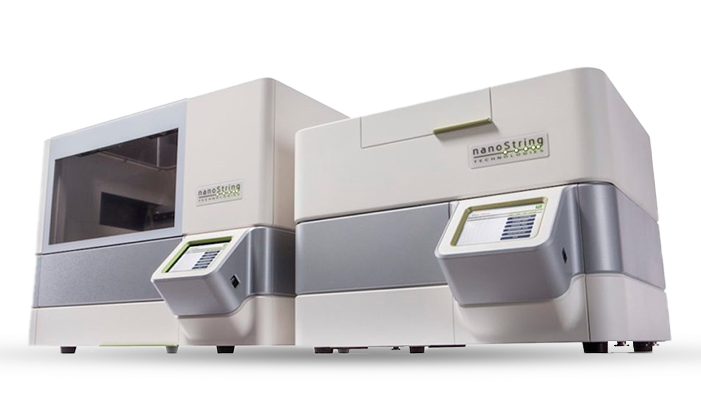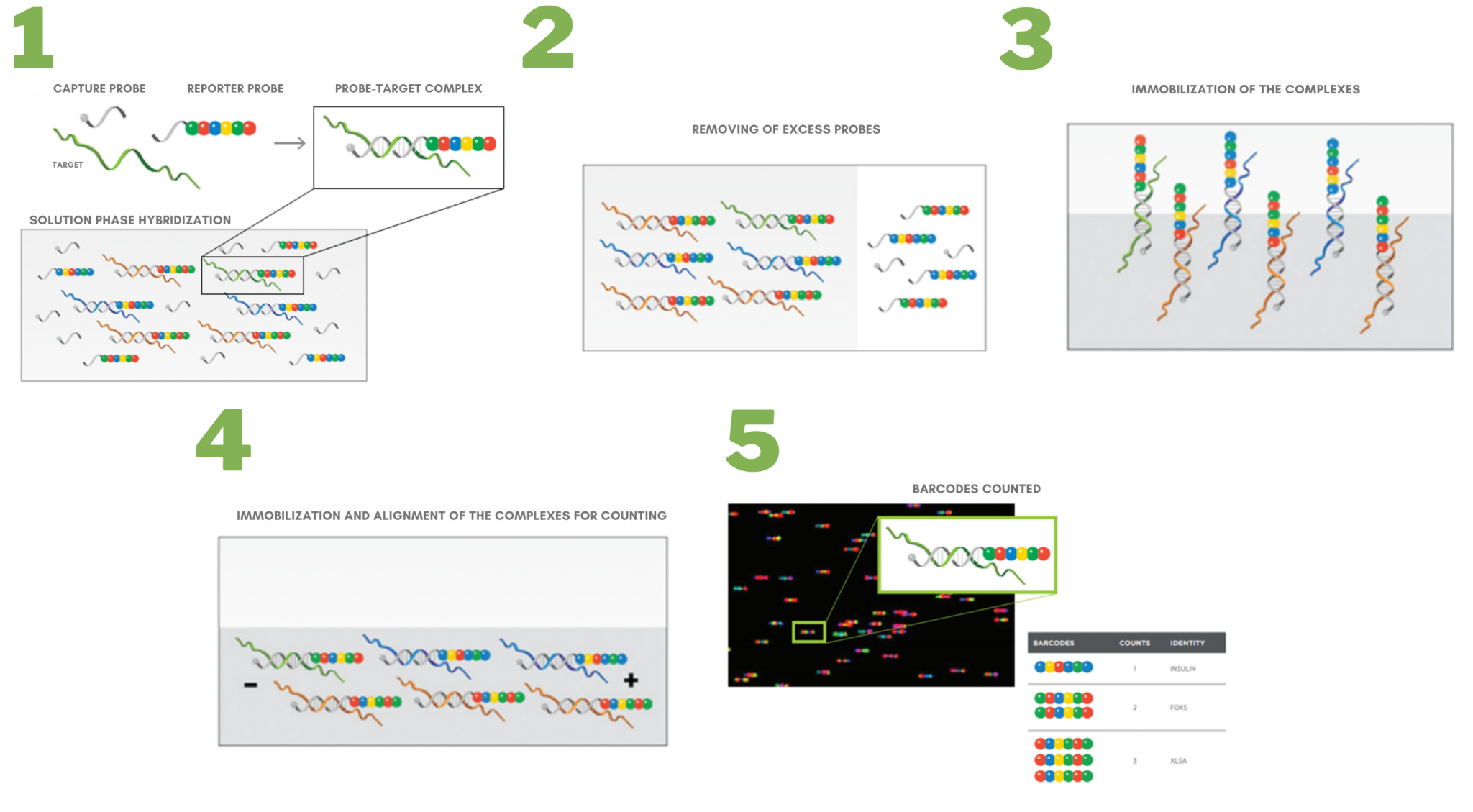nCounter | NanoString
CITOGEN offers those research centres and/or laboratories that want to use Nanostring technology, but do not have the equipment to analyze the samples, the possibility of doing it in our laboratory.
Once the project is known, our experts will help you choose the most appropriate panel for your study. Depending on the protocol to be applied, the samples will be processed in the suitable equipment and we will share the results for analysis.
The NanoString® nCounter® platform provides a fast, simple solution for multiplex analysis of up to 800 RNA or protein targets, with no amplification, cDNA conversion or library prep required.
Why choose nCounter platform?
Save Time
- Faster than qPCR, simpler than NGS.
- Only 15 minutes hands-on time
- Expertly curated panels (customized if required) for human and mouse.
Reduce errors
- No cDNA conversion, amplification or library prep needed, which can introduce bias, error and variability
Save Sample
- Optimized protocols for challenging samples, including FFPE tissue or lysates
Save Resources
- Availability of advanced analysis tools, which reduces the need for Bioinformatics support
- Digital gene expression analysis, which eliminates the need for technical replicates
Outstanding Reproducibility
- Full automatization
- High sensitivity and precision
- Quantitative digital data
- Quality assurance (ISO 13485 certified and GMP compliant)
How does it work?
NanoString’s nCounter technology is based on the digital detection of molecular barcodes (colour-coded) linked to specific probes (reporter probes) for the gene of interest. In addition, other specific probes (capture probes), covalently linked to the former, hybridize with the target sequences to allow the immobilisation of the complexes formed by target sequences and probes.
Subsequently, excess unhybridized probes are removed, and the purified complexes are immobilised and oriented for signal scanning by using an automated fluorescence microscope. The generated data (CSV files) can then be analyzed with NanoString’s free nSolver™ analysis software.
What is the process?
Consultation and Assistance with our Experts
Panel choice
A variety of expertly pre-designed and curated panels are avaible for RNA and proteins. In addition, they can be customized.
Sample Submission
Data Reception
Available Panels
Immunology
- Autoimmune Discovery Panel: Study of the relationship between autoimmune disease associated germline variants and gene expression.
- Autoimmune Profiling Panel: Study of relevant genes in autoimmune disease, chronic inflammatory disease and immunotherapy-related adverse events (human panel and mouse panel).
- Fibrosis Panel: Study of the genes which participate in the fibrotic process.
- Host Response Panel: Global study of the individual’s immune response (human or mouse) to infection.
- Human Organ Transplant Panel: Study of the individual’s immune response to transplanted tissue.
- Immune Exhaustion Panel: Gene expression study of genes related to T cell, B cell, and NK cell exhaustion in diverse contexts, including cancer and infectious disease.
- Immunology Panel: Expression study of genes related to immunology.
- Inflammation Panel: Study of the early inflammatory response.
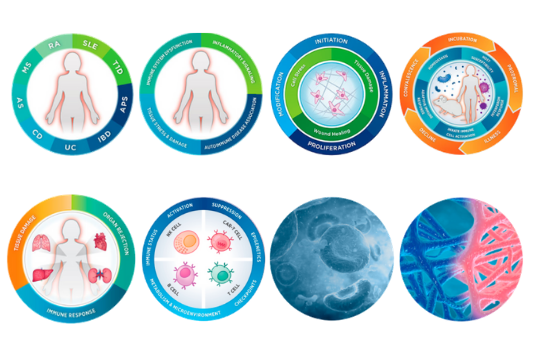
Oncology
- Breast Cancer 360 Panel: Expression study of genes involved in breast cancer biology, including tumoral microenvironment and immune response.
- PanCancer Immune Profiling Panel: Comprehensive study of the immune response, optimized for immuno-oncology research, including essential genes for the tumor biology and the tumoral microenvironment.
- PanCancer Immuno-Oncology 360 Panel: Comprehensive study of genes involved in the tumoral immune evasion and the response to immunotherapy, including essential genes for the tumoral microenvironment and the immune response.
- PanCancer Pathways Panel: Comprehensive study of genes involved in major cancer pathways, including essential genes for the tumor biology, the tumoral microenvironment and the immune response.
- PanCancer Progression Panel: Comprehensive study of genes involved in processes and mechanisms related to cancer progression, including essential genes for tumor biology, the tumoral microenvironment and the immune response.
- Tumor Signaling 360 Panel: Comprehensive study of dysfunctional cell signaling in cancer, including essential genes for the tumor biology, the tumoral microenvironment and the immune response.
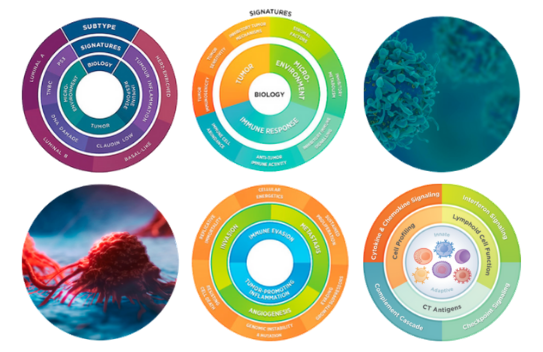
Inmuno - Oncology
- CAR-T Characterization Panel: Study of gene expression aimed at the development of CAR-T cell therapies.
- Myeloid Innate Immunity Panel: Comprehensive gene expression study of myeloid-derived cells.
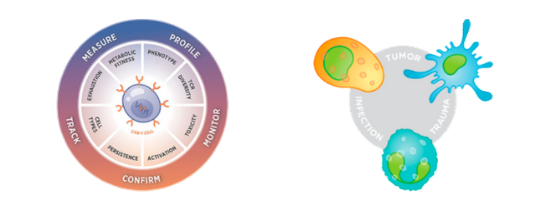
Neurocience
- Alzheimer’s Disease Panel: Expression study of genes related to Alzheimer’s Disease.
- Glial Profiling Panel: Comprehensive expression study of genes in astrocytes, microglia, and oligodendrocytes, allowing a better understanding of neurodegenerative and neuroinflammatory disorders and neurotrauma.
- Neuroinflammation Panel: Comprehensive expression study of genes from pathways, processes and cell types involved in neuroinflammation.
- Neuropathology Panel: Expression study of genes involved in six fundamental themes of neurodegeneration: neurotransmission, neuron-glia interaction, neuroplasticity, cell structure integrity, neuroinflammation, and metabolism.
Mother Cells/Regenerative Medicine
- Stem Cell Characterization Panel: Study of gene expression aimed at the development of Stem Cell therapies.
For more information about this type of studies, please contact us.
¿Hablamos?
Nuestro equipo de especialistas se pondrá en contacto contigo a la mayor brevedad para resolver todas tus dudas.

